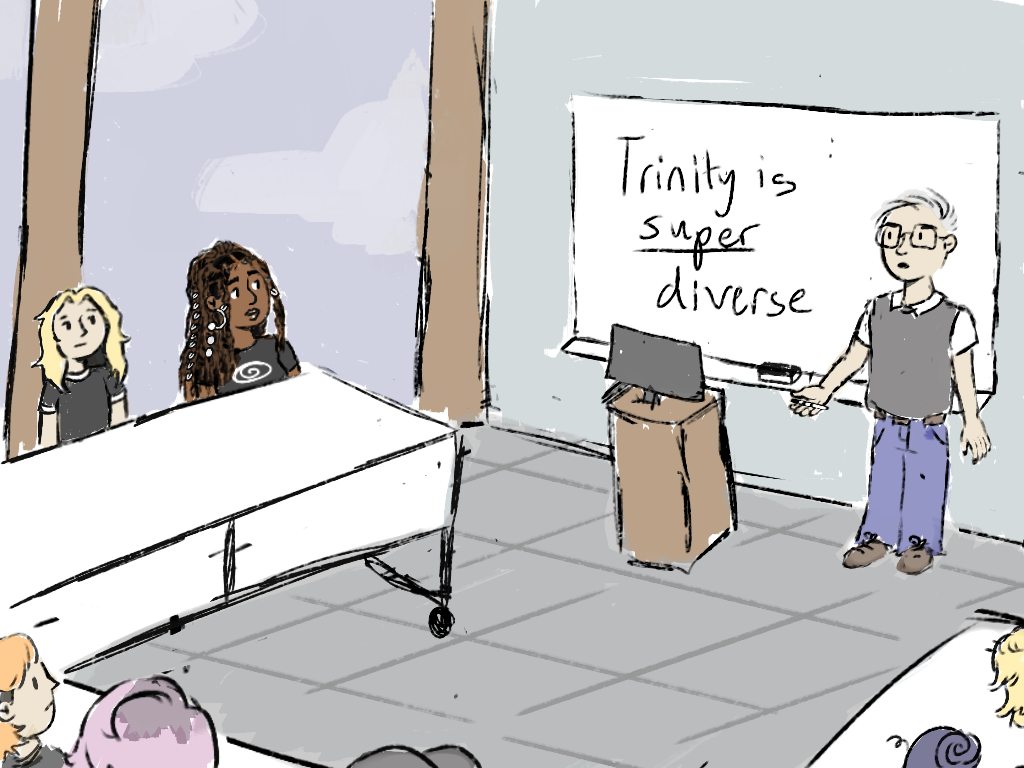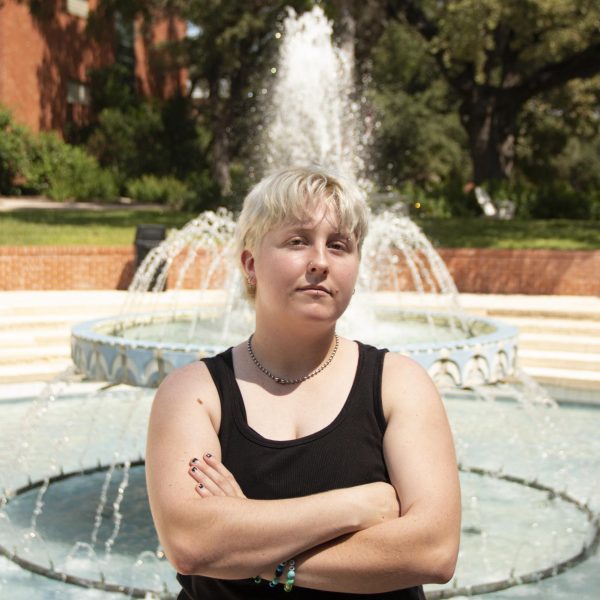The most challenging part of a microaggression is not the act itself but the lingering aftermath, a reality I know all too well. Being a person of color (POC) at a predominantly white institution (PWI) is no easy endeavor, and that’s especially true here. Trinity University’s progressive, future-thinking facade provides an impression of inclusion — not diversity, to be clear, inclusion — but all it takes is a gust of wind to topple over that house of cards. Just because this school and its students, faculty and staff are good at hiding it, doesn’t change the fact that Trinity can do so much more to educate its community on how to appreciate diversity.
Almost every POC that I know at this school has faced some form of veiled racism, be it from an ignorant student or an entitled professor. It makes us more self-conscious about participating in conversations and sharing personal experiences. For instance, when I remarked that potholes can be a really annoying problem during a class discussion about infrastructure, my professor and several students dismissed my complaint, essentially saying, “Yeah, but that was in India, so the roads are just bad there.” To be clear, I was referring to a pothole near my old high school in a small city outside of Houston, very much not in India. I was literally making a joke. An assumption was made, and I never willingly spoke in that class again.
Racism is still real even if it’s an unintentional act of ignorance or humor. It’s real when an offhand remark has you reeling for hours after, going back and forth between being hurt and confused. Last semester, I lived with two Indian girls and people would frequently remember my name because I was the only one of the three not suffering through pre-med courses. I heard a lot of ‘reasons’ for why they got my name wrong: We’re always together; we look alike; we speak the same languages — but no excuse justifies the same kid I’ve known for two years now needing to use the process of elimination just to remember “which one I am.”
People of color are forced to constantly renegotiate parts of their identity after facing microaggressions to avoid the discomfort and invalidation that can arise from being misinterpreted or dismissed. Sure, it could start as an innocent compromise, like not correcting someone when they mispronounce your name, but it grows. When high school teachers pronounced my name as “Die-ah,” I’d never correct them because they’d “forget” by next week. This had happened to me countless times throughout my life, but it took until I read a Trinitonian article, “Why getting ethnic names right matters,” my first year at Trinity to actually realize that by allowing my name to be whitewashed I was diminishing my identity.
As such, I’ve tried to make a conscious effort to call out microaggressions whenever possible, but I’m definitely not perfect at this. I’ve gone up to professors after class and said that their assertions are untrue and indirectly contribute to the white supremacist mindset many people in this community seem to be afflicted with. I’m usually met with some sort of half-baked “I’m sorry you feel that way, but…” response, which can be just as invalidating as the act itself.
Although you can report a microaggression, it’s not exactly easy. The process is so convoluted with red tape that it might just be easier to let it go. Trinity’s website directs complaints about racial discrimination to Kateeka Harris, interim Title IX and Equal Opportunity Services coordinator. Coupling the two proves Trinity’s inadequate dedication of resources to both acts of prejudice, which only exacerbates the problems that POC face here. Furthermore, how can students feel safe through the reporting process when the university has such a problematic track record? Professors, faculty and even alumni — for instance, John Cornyn, current U.S. Senator with a lack of comprehension of systemic racism — who act racist are a reflection of the institution’s inefficient diversity training; there’s very little sense in complaining to a volcano about its own lava.
The Trinity administration’s prior actions have also added to its unapproachability. In December of last year, Nammie Ichilov, president and CEO of the Jewish Federation of San Antonio, gave a splendidly uninformed and blatantly Islamaphobic speech with the blessing of none other than Trinity’s president’s office — exemplified by the event’s moderation by the President’s Special Advisor for Inclusive Excellence. We’ve heard not a peep from the school in the form of an apology for bringing this spectacularly uneducated and downright hateful man to campus, but that’s unsurprising.
The action of endorsing Ichilov did so much more than just giving a platform to someone who didn’t deserve it, it also damaged the university’s credibility and diminished any possible semblance of safety a person of color could feel on campus here. I can’t even begin to imagine how hurt students of color felt while seated in the ironically named Fiesta Room that day, listening to a bigoted little white man spew misinformation and racist propaganda, all with the A-OK of the university we’re going into debt to attend.
Consider this article an open letter to Trinity’s administration to do better. Educate Trinity’s membership to make this place less hateful. Students and faculty alike need diversity training upon which their continued attendance at this institution depends. Trinity has the unique opportunity to prevent any more students from graduating lest they be anti-racist. As a PWI desperately trying to attain the status of a Hispanic-serving institution, fostering the kind of environment where POCs are uncomfortable speaking their minds and are frequently victims of microaggressive behavior is absolutely unacceptable. This isn’t a request, it’s a demand: do better.









Em • Sep 29, 2024 at 12:21 am
You’re clearly not uncomfortable expressing your opinion. In fact, there is social capital in it. On the other hand I have the good sense to post anonymously in order to express an objection to the creation of a Mccarthy-esque, Dolores Umbridge policing position for whom one’s ONLY job duty is hunting down and punishing people who have unintentionally offended someone.
What is the punishment for a microagression? What is the punishment for causing offense in a mind, likely, that is turning over stones looking for confirmation? That said, the pothole example was egregious. If that actually happened, I am sorry. Having lived abroad as a minority at another institution I can tell you that human beings default to tropes and oversimplifications. People use heuristics. I assure you, any observation I would have made about other students’ assumptions— mostly based on TV shows and movies—would not have been in the school paper.
Blatant racism should be rooted out, but hunting down ephemeral microagressions creates a community of fear. As the Jacobins learned, the metrics for what is a transgression can shift beneath them. What if, after a time, the microagression committee reviewed this exact article and your use of “little white man” — clear modern shorthand for contemptible and deserving of a sneer — what then? I think tolerance and understanding are the ideals to which we should aspire, not rigidity and curving walkways paved with eggshells and mines.
Diya Contractor • Nov 14, 2024 at 1:43 pm
Thank you for sharing your thoughts—I appreciate you taking the time to read my piece and express your perspective. I understand your concern about fostering an environment where people feel overly scrutinized or afraid to speak. I agree that open, constructive conversations are essential to a healthy, inclusive community, and I’d never want anyone to feel stifled in expressing themselves. However, I also think it’s important to recognize that when certain assumptions or biases go unaddressed, they can create a lasting negative impact, especially for people who already feel marginalized or isolated.
The issue with microaggressions, as I see it, isn’t about policing every word or misstep. Rather, it’s about creating awareness so that we’re more mindful of the assumptions we might unintentionally bring into our interactions. When people repeatedly experience microaggressions, it can affect their confidence and willingness to participate, as I shared in my examples. I believe that through education and training—not punishment—our community can work toward a space where people of all backgrounds feel respected and included.
I agree that tolerance and understanding are key. My hope is for a culture of accountability, where people are encouraged to learn and grow from each other instead of an environment of fear. By raising these issues, I intend to push or inspire Trinity to prioritize inclusive policies and training that help prevent misunderstandings and foster genuine connections among everyone here.
Thanks again for your engagement with this topic—I value the chance to discuss this further.